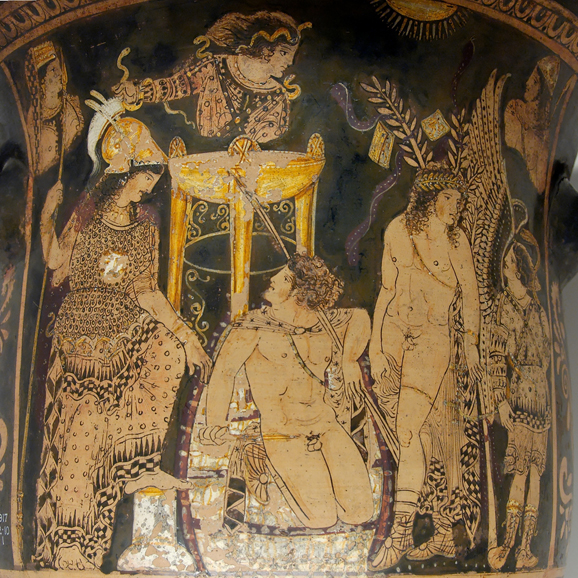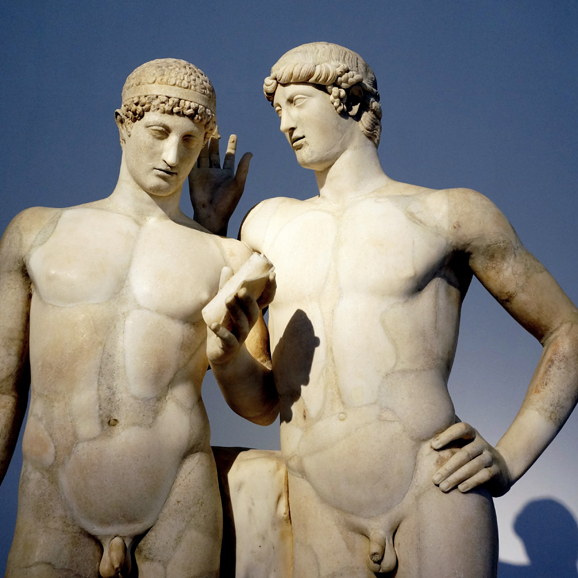“All happy families are alike,” Leo Tolstoy wrote in “Anna Karenina.” “Each unhappy family is unhappy in its own way.”
Fiction — for which conflict is the lifeblood — has charted this in every way imaginable, rarely better than in the myths and dramas of the ancient Greeks. With the backdrop of the Olympians — a family of boisterous, squabbling gods and goddesses — meddling in the affairs of humans fatally flawed by hubris, Aeschylus, Sophocles and Euripides spun tales of families divided by loyalties (Sophocles’ “Antigone”) and ravaged by betrayal and retribution (Euripides’ “Medea”).
But perhaps the daddy of all family dramas is Aeschylus’ “The Oresteia,” the only extant example of an ancient Greek theater trilogy, which took first prize in the Dionysia festival in Athens in 458 B.C. and would influence the work of modern storytellers like Eugene O’Neill, Jean-Paul Sartre and Joyce Carol Oates.
The back story begins as all tragedies do — with someone else’s thoughtless act. Eris, the goddess of discord — think the wicked fairy in the “Sleeping Beauty” story — has not been invited to the Olympian wedding of King Peleus and the sea goddess Thetis, who will become the parents of the Greeks’ greatest warrior, Achilles. So she tosses the guests an apple that says, “To the fairest.” Hera, queen of the gods, and her stepdaughters Athena, goddess of wisdom, and Aphrodite, goddess of love and beauty, immediately begin to fight over it. Off they go — accompanied by stepson/brother Hermes, the winged messenger god — to be judged in all their fleshly glory and with all their worldly bribes by the Trojan shepherd/prince Paris, a gorgeous layabout. Paris chooses Aphrodite and her promise of the world’s greatest beauty, Helen, who unfortunately is married to Menelaus, king of Sparta.
Menelaus doesn’t take kindly to being cuckolded and enlists his older brother, Agamemnon, king of Mycenae (also called Argos), in spearheading a war of revenge on Troy. (The brothers have a family history of adultery, murder, revenge, cannibalism and curses upon their house, so you know things aren’t going to go well.) On the island of Aulis, the campaign is stalled by Athena’s and Aphrodite’s sister, Artemis, goddess of the hunt, who demands a human sacrifice in that peremptory way that gods do. So Agamemnon devises a ruse to lure his oldest daughter, Iphigenia, to the island, sending word that she is to be married to Achilles. What Agamemnon doesn’t count on, or care about, is his wife Clytemnestra’s outrage at having her child sacrificed and Achilles’ anger at being used. (This story is poignantly told in Euripides’ “Iphigenia in Aulis” and in the 1977 Greek film “Iphigenia.” The scene in which Iphigenia, recognizing that the only thing she can control is her attitude toward her death, relieves Achilles of his pledge to defend her and goes off to that death remains one of the most moving and memorable moments in drama.)
With the noble Iphigenia thus dispatched — in the deus ex machina that is sometimes part of the story, she’s spirited away by Artemis to become her priestess — and the Greeks bound for Troy, the stage is set for the bad blood between Agamemnon and Achilles that will drive the opening of Homer’s “The Iliad” and for the sequence of ghastly events that mark “The Oresteia.”
In the first play in the trilogy, “Agamemnon,” he returns to Mycenae, where Clytemnestra and her lover — Agamemnon’s vindictive, dispossessed cousin Aegisthus — wait as patient as cobras, ready to strike. Wielding an ax, Clytemnestra hacks him and his enslaved mistress, the doomed-never-to-be-believed Trojan prophetess/princess Cassandra, into pieces, mimicking the animal sacrifices that mirror daughter Iphigenia’s death. The arrogant Aegisthus becomes king, but the Greek chorus — there’s always a Greek chorus — warns that Orestes, Agamemnon and Clytemnestra’s son, will come home to exact vengeance.
In “The Libation Bearers,” Orestes — spurred by his sister Electra, a daddy’s girl if there ever was one, and his soulmate, Pylades — exacts that revenge, even as Clytemnestra bares the breasts that nurtured him. With the blood of Aegisthus and his mother on his hands, Orestes is now hounded by the Furies, female deities who avenge injustice, in the final play, “The Eumenides” (“The Kindly Ones.”) But a trial ensues, with Apollo, god of truth, representing the defendant, and Athena casting the deciding vote for acquittal.
“The Oresteia” — which is often viewed as a shift from vengeance to justice, from a matrilineal society to a patriarchy — inspired Eugene O’Neill’s 1931 trilogy “Mourning Becomes Electra,” set in Civil War New England with a sub-theme of incest between the Electra and Orestes characters. Among the other notable versions are Jean-Paul Sartre’s play “The Flies” (1943), an existential take on embracing the circumstances in which you find yourself, and Joyce Carol Oates’ 1981 novel “Angel of Light,” which locates “The Oresteia” amid the politics of Washington, D.C.
But perhaps the work that comes closest in epic spirit, if not in plot, to “The Oresteia” is “The Godfather” trilogy, in which the tragic hero, Michael Corleone, is drawn deeper into the family’s mob activities as a way to save and protect the family. When he forgets what family is, however — shunning his estranged wife, Kay, for having an abortion and, especially, murdering his hapless brother Fredo for his unwitting role in a plot to kill him — he crosses the line into true villainy.
And so he pays with the life of the family member he cherishes most, his daughter, Mary.
It is an ending of which both Tolstoy and the ancient Greeks would’ve approved.






